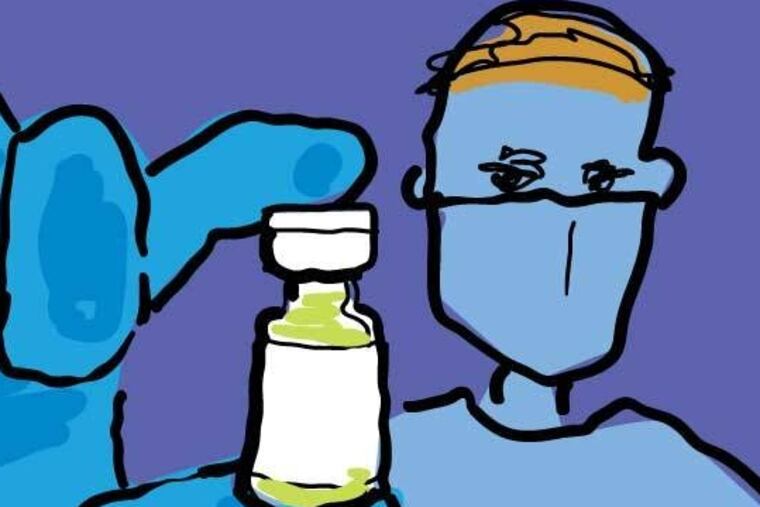Am I going to get COVID again? What to know about reinfection.
More people are getting reinfected, but experts say that's no reason to lose confidence in the vaccines.

By now, everyone knows someone who’s had COVID-19 — even if they’ve somehow managed to escape it themselves — and an increasing number of people are getting infected a second time.
The vast majority of those infections will not cause severe disease or death. Most people have some immunity, even against the newer versions of the omicron variant, whether the result of vaccination, a prior infection, or both.
But that’s no reason to give up on precautions entirely, infectious disease experts say. A person with a mild case can still pass it on to someone who is more vulnerable. And long COVID remains poorly understood.
As COVID becomes a fixture of American life, here’s what infectious disease experts say about the future.
How often will I get COVID in the future?
As of mid-July, the average time between infections is about nine months, according to a nationwide sample from Helix, a genetic testing company in San Mateo, Calif.
For now, that trend seems to be moving in the right direction. In April, the average time between infections was less than eight months, Helix reported.
What the future looks like is unclear, but scientists have looked for clues in the four coronaviruses that cause the common cold. In one such study, researchers found that people often went a year between infections with one of those viruses — but in some cases, as little as six months.
In the long term, the coronavirus that causes COVID may infect people as often as two to three times a year, epidemiologist Michael Mina told the New York Times.
But as with other respiratory viruses, some of those infections will be so mild as to go unnoticed, Drew University biologist Brianne Barker said.
Will COVID become like the common cold?
COVID is a cousin of the coronaviruses that cause colds, some of which have been circulating in human populations for centuries. Still, it isn’t clear whether COVID will end up like them. For now, it is far more deadly than the other coronaviruses, and it seems to be more transmissible — though the others have not been subjected to anywhere near the same degree of study.
“Understanding the depth of immune response to those viruses is limited,” said E. John Wherry, director of the University of Pennsylvania’s Institute for Immunology. “We don’t know what they first looked like when they entered the human population.”
The hope is that this coronavirus will become as benign as its common-cold cousins, through a combination of vaccination and immunity that lingers from prior infection. But riskier variants could yet emerge.
» READ MORE: What will living with COVID mean for the coming years? The common cold may provide clues
Is BA.5 really more transmissible?
The omicron variant has dominated the COVID landscape for months in the United States, most recently in the form of a subvariant called BA.5.
BA.5 is generally thought to be more transmissible than its predecessors. But just how much, and why, is not fully understood, said Drew’s Barker, who studies the immune response to viruses.
Some of BA.5′s edge may come from evading the immunity that people have from vaccination or past infection. Some might be the result of mutations that enable it to thrive in other ways, say, by making more copies of itself so that infected people are more likely to pass it on.
» READ MORE: Why BA.5 is not a super-virus, and how the vaccines are still the best option against COVID
Do breakthrough infections mean the vaccines have lost their punch?
Breakthrough infections and reinfection may seem discouraging, but that’s no reason to lose confidence in the vaccines.
The vaccines still reduce the risk of infection, especially in people who’ve gotten one of the shots recently. In a new study JAMA Network Open, Rhode Island residents who had been vaccinated after being infected were half as likely to become infected again, relative to people who had not been vaccinated.
The vaccines also reduce the chance that an infected person will pass on the disease, because a vaccinated person “sheds” smaller amounts of virus and recovers more quickly than the unvaccinated, according to another study in the same journal.
Most important: even with the newer COVID variants, the vaccines still protect against severe disease.
Yet COVID variants may continue to evolve to be more effective at getting through the body’s initial line of immune defense. For now, that likely means regular booster shots will be recommended, Penn’s Wherry said.
Scientists also are working on “pan-coronavirus” vaccines, which could protect against future variants of this coronavirus and against others — even viruses that have yet to surface, or make the jump from animals to humans.
If I’m eligible for a booster, should I get it now or wait for the omicron version this fall?
Vaccine makers have told U.S. health officials that by mid-September, they can deliver a booster shot tailored to protect against various versions of omicron variant, the New York Times reported last week.
So it might make sense to wait until then for a booster shot, said Shane Crotty, a virologist at the La Jolla Institute for Immunology.
“You can’t get a vaccine shot Aug. 1 and get another vaccine shot Sept. 15 and expect the second shot to do anything,” he told the media outlet. “You’ve got so much antibody around, if you get another dose, it won’t do anything.”
Still, the original vaccines remain protective against severe disease and death. If you haven’t gotten one yet, physicians urge rolling up your sleeve as soon as possible.